Demolition Contractors Southam
Find top Building Demolition in Southam
Receive up to 3 Demolition Contractors quotes for your project today! Compare profiles, reviews, accreditations, portfolio, etc... and choose the best deal.

Warwick Reclamation
4.259 reviewsWarwick, GBWarwick Reclamation: Your Source for Quality Reclaimed Building Materials and Architectural Antiques Warwick Reclamation is a family-run business dedicated to providing high-quality, traditional reclaimed building materials and architectural antiques to both the trade and the public. We take pride in offering a wide selection of specialist reclaimed and salvaged materials to enhance your garden and home. Our 2-acre site boasts a two-story showroom, showcasing a diverse range of materials. Whether you're looking for unique building materials, charming garden features, or exquisite interior pieces, we have something to suit every taste and project. We invite you to explore our extensive collection and discover the beauty and character that reclaimed materials bring to any space. Our knowledgeable team is always available to assist you in finding the perfect pieces to bring your vision to life.
- Services
- Why Us?
- Gallery
Get Quote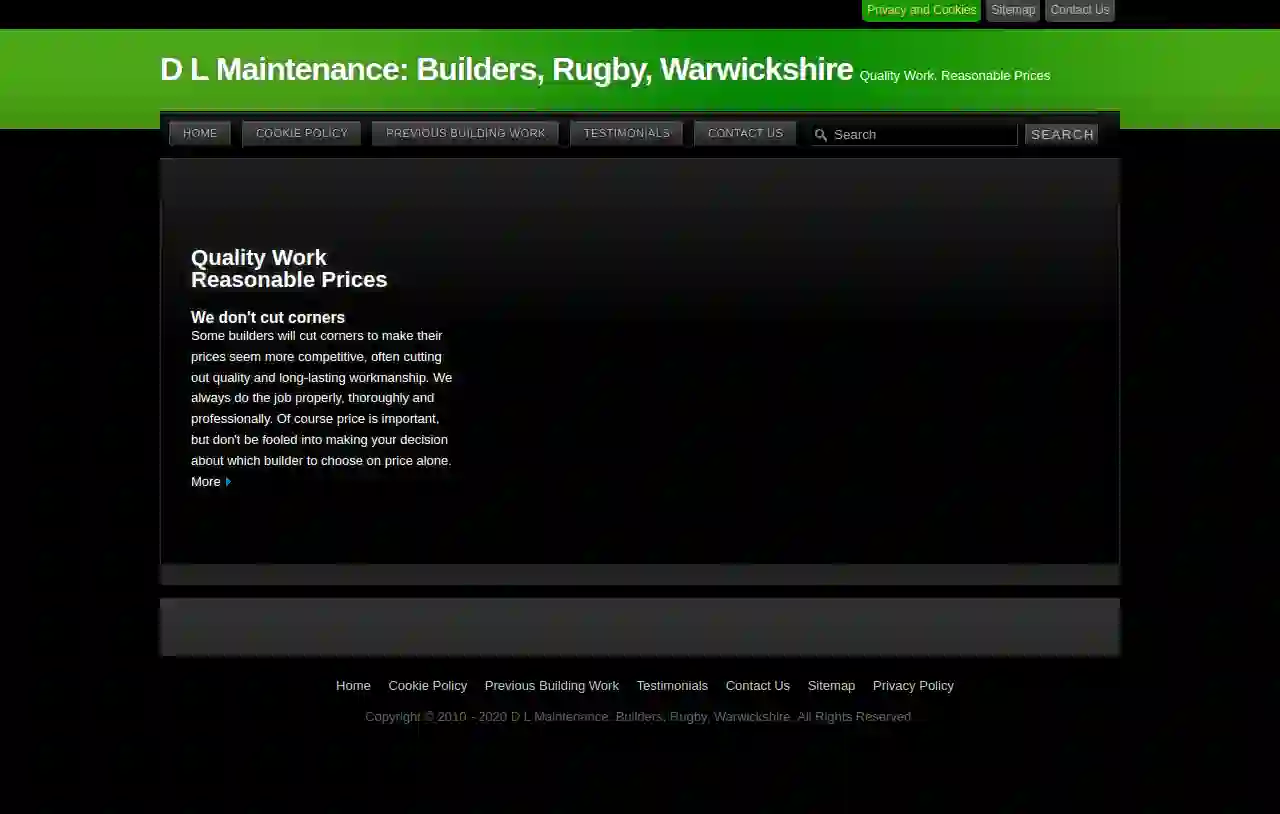
D L Maintenance
51 reviewsRugby, GBQuality Work, Reasonable Prices We don't cut corners. Some builders will cut corners to make their prices seem more competitive, often cutting out quality and long-lasting workmanship. We always do the job properly, thoroughly and professionally. Of course price is important, but don't be fooled into making your decision about which builder to choose on price alone. At D L Maintenance, we pride ourselves on delivering high-quality building services at competitive prices. We understand that your home is your most valuable asset, and we treat it with the utmost care and respect. Our team of experienced builders is dedicated to providing you with the best possible service, from start to finish. We offer a wide range of building services, including: Bricklaying Building Repairs Patios and Driveways Fencing Roof Repairs And much more! We are committed to providing our clients with the highest level of customer service. We are always happy to answer any questions you may have and provide you with a free, no-obligation quote. Contact us today to discuss your building needs.
- Services
- Why Us?
- Testimonials
Get Quote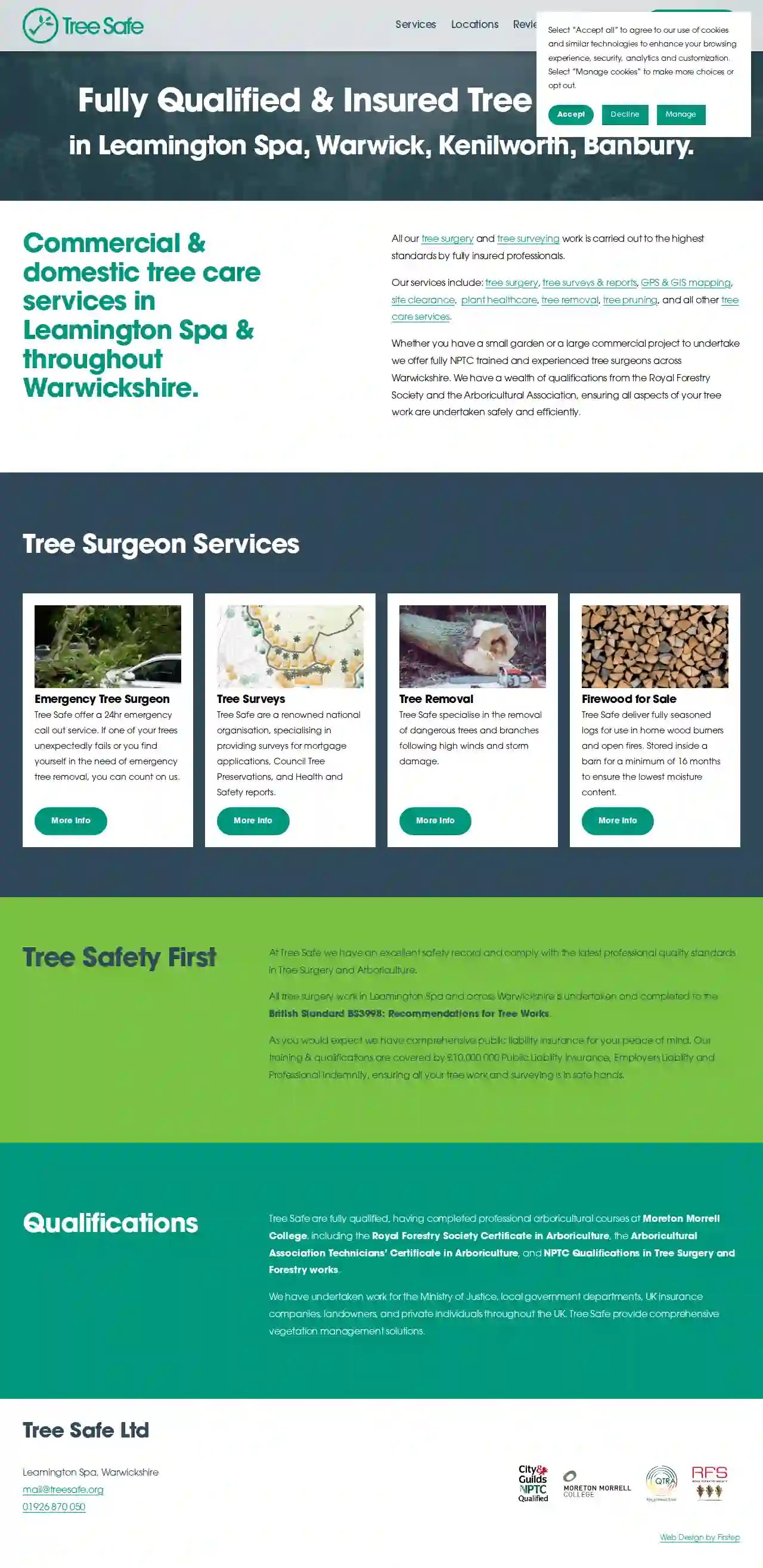
Tree Safe
4.36 reviewsWarwick, GBFully Qualified & Insured Tree Surgeons in Leamington Spa, Warwick, Kenilworth, Banbury. Commercial & domestic tree care services in Leamington Spa & throughout Warwickshire. All our tree surgery and tree surveying work is carried out to the highest standards by fully insured professionals. Our services include: tree surgery, tree surveys & reports, GPS & GIS mapping, site clearance, plant healthcare, tree removal, tree pruning, and all other tree care services. Whether you have a small garden or a large commercial project to undertake we offer fully NPTC trained and experienced tree surgeons across Warwickshire. We have a wealth of qualifications from the Royal Forestry Society and the Arboricultural Association, ensuring all aspects of your tree work are undertaken safely and efficiently. Tree Surgeon Services Tree Safe offer a 24hr emergency call out service. If one of your trees unexpectedly fails or you find yourself in the need of emergency tree removal, you can count on us. Tree Surveys Tree Safe are a renowned national organisation, specialising in providing surveys for mortgage applications, Council Tree Preservations, and Health and Safety reports. Tree Removal Tree Safe specialise in the removal of dangerous trees and branches following high winds and storm damage. Firewood for Sale Tree Safe deliver fully seasoned logs for use in home wood burners and open fires. Stored inside a barn for a minimum of 16 months to ensure the lowest moisture content. Tree Safety First At Tree Safe we have an excellent safety record and comply with the latest professional quality standards in Tree Surgery and Arboriculture. All tree surgery work in Leamington Spa and across Warwickshire is undertaken and completed to the British Standard BS3998: Recommendations for Tree Works. As you would expect we have comprehensive public liability insurance for your peace of mind. Our training & qualifications are covered by £10,000,000 Public Liability Insurance, Employers Liability and Professional Indemnity, ensuring all your tree work and surveying is in safe hands. Qualifications Tree Safe are fully qualified, having completed professional arboricultural courses at Moreton Morrell College, including the Royal Forestry Society Certificate in Arboriculture, the Arboricultural Association Technicians’ Certificate in Arboriculture, and NPTC Qualifications in Tree Surgery and Forestry works. We have undertaken work for the Ministry of Justice, the Environment Agency, and many local councils.
- Services
- Why Us?
- Testimonials
- Gallery
Get Quote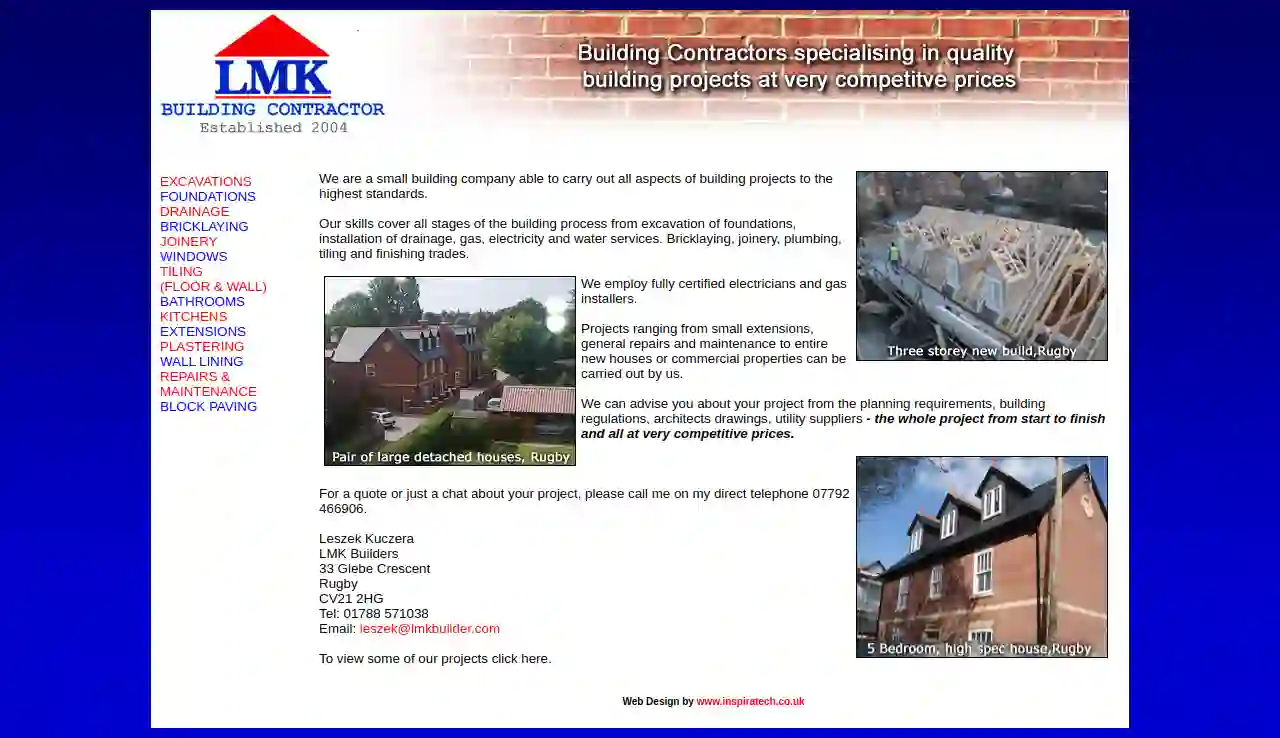
L M K Builders Ltd
52 reviews33 Glebe Crescent, Rugby, CV21 2HG, GBLMK Builders: Your Trusted Partner for Building Projects LMK Builders is a small, dedicated building company with a commitment to delivering high-quality workmanship across all aspects of your project. We handle everything from the initial excavation and foundation work to the final finishing touches, ensuring a seamless and professional experience. Our team of skilled professionals covers all stages of the building process, including: Excavation and Foundations Drainage, Gas, Electricity, and Water Services Installation Bricklaying, Joinery, Plumbing, Tiling Finishing Trades We take pride in employing fully certified electricians and gas installers, ensuring your project meets the highest safety standards. Whether you're planning a small extension, general repairs and maintenance, or a complete new house or commercial property, we have the expertise and experience to handle it all. We understand that building projects can be complex, so we offer comprehensive guidance throughout the process. From planning requirements and building regulations to architect drawings and utility suppliers, we're here to support you every step of the way. Our competitive pricing ensures you get the best value for your investment. Contact us today for a free quote or to discuss your project in detail. We're eager to help you bring your vision to life.
- Services
- Why Us?
- Gallery
Get Quote
Postlethwaite Groundworks
32 reviewsCoben, Gaydon Road, Bishop's Itchington, Southam, CV47 2QZ, GBPostlethwaite Groundworks: Your Trusted Groundwork Experts in Warwickshire Established in 1989, Postlethwaite Groundworks is a family-run business with a strong reputation for providing high-quality groundwork services to industrial, agricultural, commercial, and domestic clients throughout Warwickshire and the surrounding counties. We take pride in our professional approach and commitment to delivering exceptional service. Our team of highly skilled and experienced professionals is dedicated to exceeding your expectations. We specialize in concrete laying, utilizing the latest laser screed machinery to ensure efficient and precise results. We also undertake all aspects of groundwork, including: • Concrete Laying • Power Floating • Demolition & Site Clearance • Groundworks • Self Builds • New Builds • Foundations • Drainage & Sewerage • Excavation Services Whether you need a new driveway, foundations for a home extension, or comprehensive groundwork for a large-scale industrial project, Postlethwaite Groundworks has the expertise and resources to handle it all. We are fully insured and offer competitive pricing, ensuring you receive the best value for your investment. Contact us today to discuss your project requirements and let us help you bring your vision to life.
- Services
- Why Us?
- Gallery
Get Quote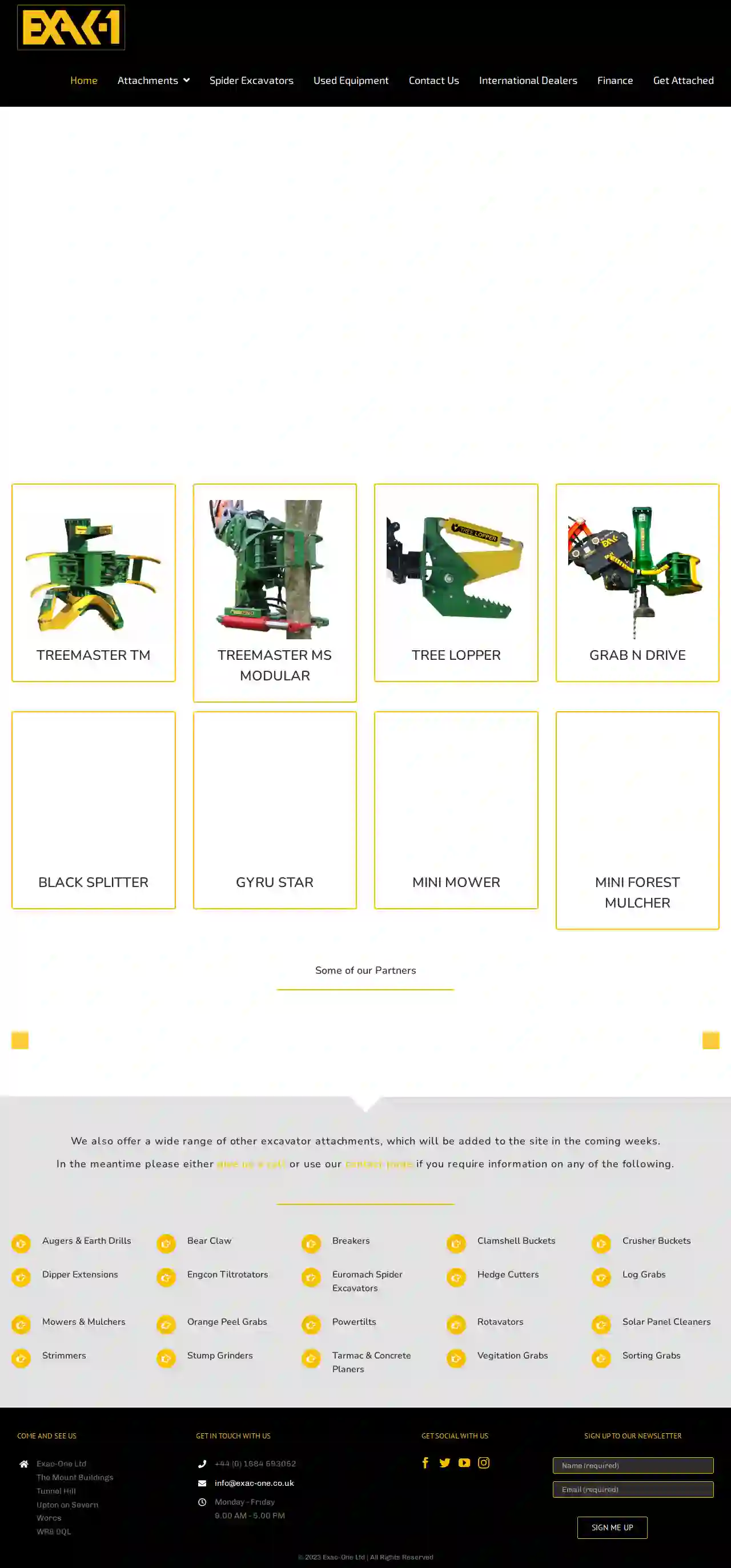
Exac-One Ltd
4.47 reviewsThe Mount Buildings, Tunnel Hill, The Mount BuildingsTunnel HillUpton on SevernWorcs, Upton on Severn, WR8 0QL, GBExac-One Ltd: Your One-Stop Shop for Excavator Attachments Exac-One Ltd is a leading supplier of high-quality excavator attachments for a wide range of applications. We offer a comprehensive selection of attachments, including augers, trenchers, timber splitters, breakers, mowers, mulchers, stump grinders, tree shears, and more. Our attachments are designed to meet the demanding needs of our customers, and we are committed to providing exceptional customer service and support. We understand that choosing the right excavator attachment can be a daunting task. That's why we offer expert advice and guidance to help you find the perfect solution for your specific needs. Our team of experienced professionals is dedicated to helping you make the right decision for your business. Our Commitment to Quality At Exac-One Ltd, we are committed to providing our customers with the highest quality excavator attachments available. We source our products from reputable manufacturers around the world, and we rigorously test all of our attachments to ensure they meet our strict quality standards. We are confident that our attachments will provide you with years of reliable service. We also offer a comprehensive warranty on all of our products, giving you peace of mind knowing that your investment is protected. Our Services In addition to our wide selection of excavator attachments, we also offer a range of services to help you get the most out of your equipment. These services include: Expert advice and guidance on choosing the right attachment for your needs On-site installation and commissioning Comprehensive maintenance and repair services Spare parts and accessories Contact Us Today If you are looking for high-quality excavator attachments and exceptional customer service, contact Exac-One Ltd today. We would be happy to answer any questions you may have and help you find the perfect solution for your needs.
- Services
- Why Us?
- Gallery
Get Quote- LM
LMH Groundwork Contractors
51 reviewsWarwick, GB- Services
- Why Us?
- Gallery
Get Quote 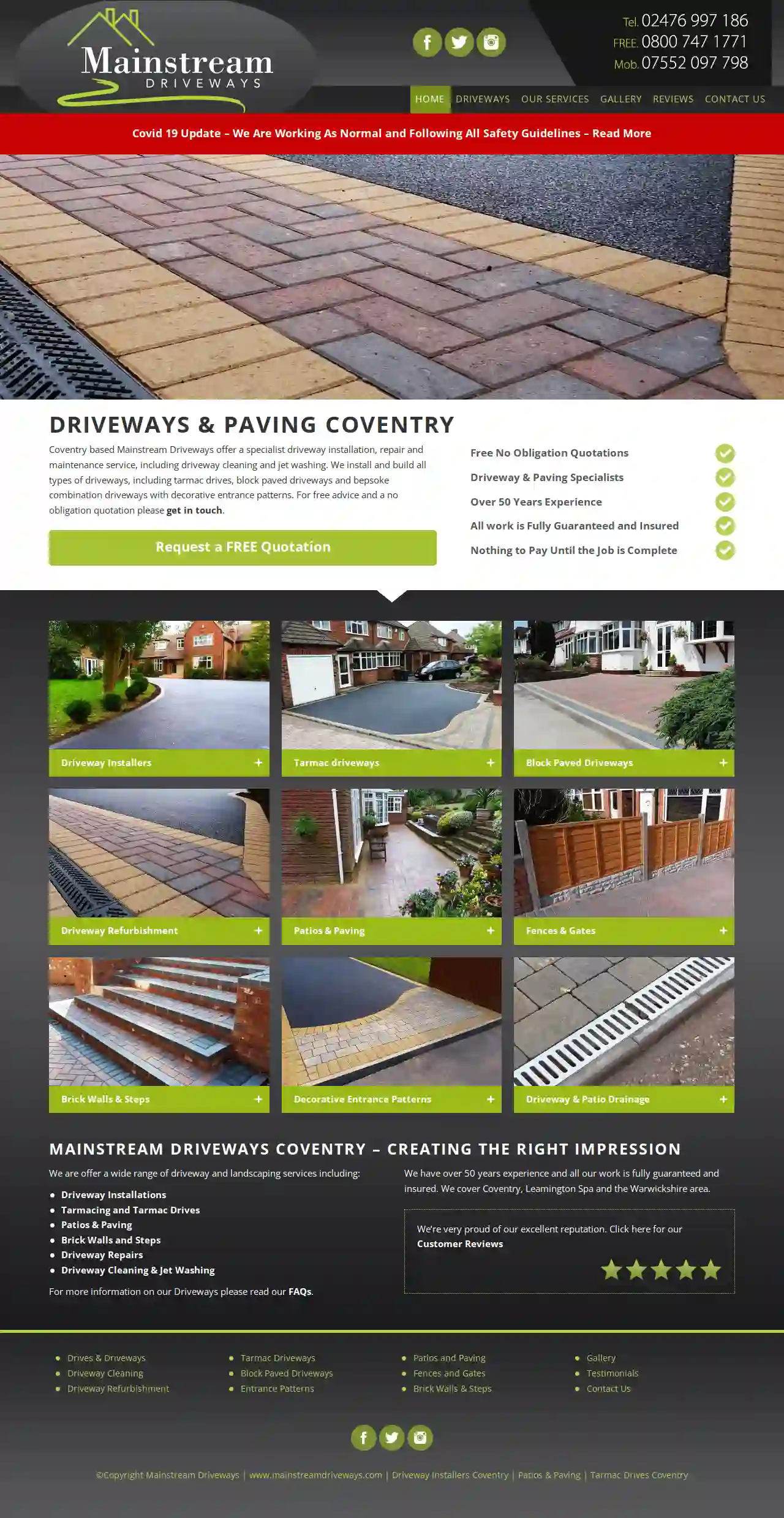
Mainstream Driveways
4.415 reviewsWarwick, GBMainstream Driveways Coventry – Creating the Right Impression Coventry based Mainstream Driveways offer a specialist driveway installation, repair and maintenance service, including driveway cleaning and jet washing. We install and build all types of driveways, including tarmac drives, block paved driveways and bespoke combination driveways with decorative entrance patterns. For free advice and a no obligation quotation please get in touch. We are offer a wide range of driveway and landscaping services including: Driveway Installations Tarmacing and Tarmac Drives Patios & Paving Brick Walls and Steps Driveway Repairs Driveway Cleaning & Jet Washing For more information on our Driveways please read our FAQs. We have over 50 years experience and all our work is fully guaranteed and insured. We cover Coventry, Leamington Spa and the Warwickshire area. We’re very proud of our excellent reputation. Click here for our Customer Reviews
- Services
- Why Us?
- Gallery
Get Quote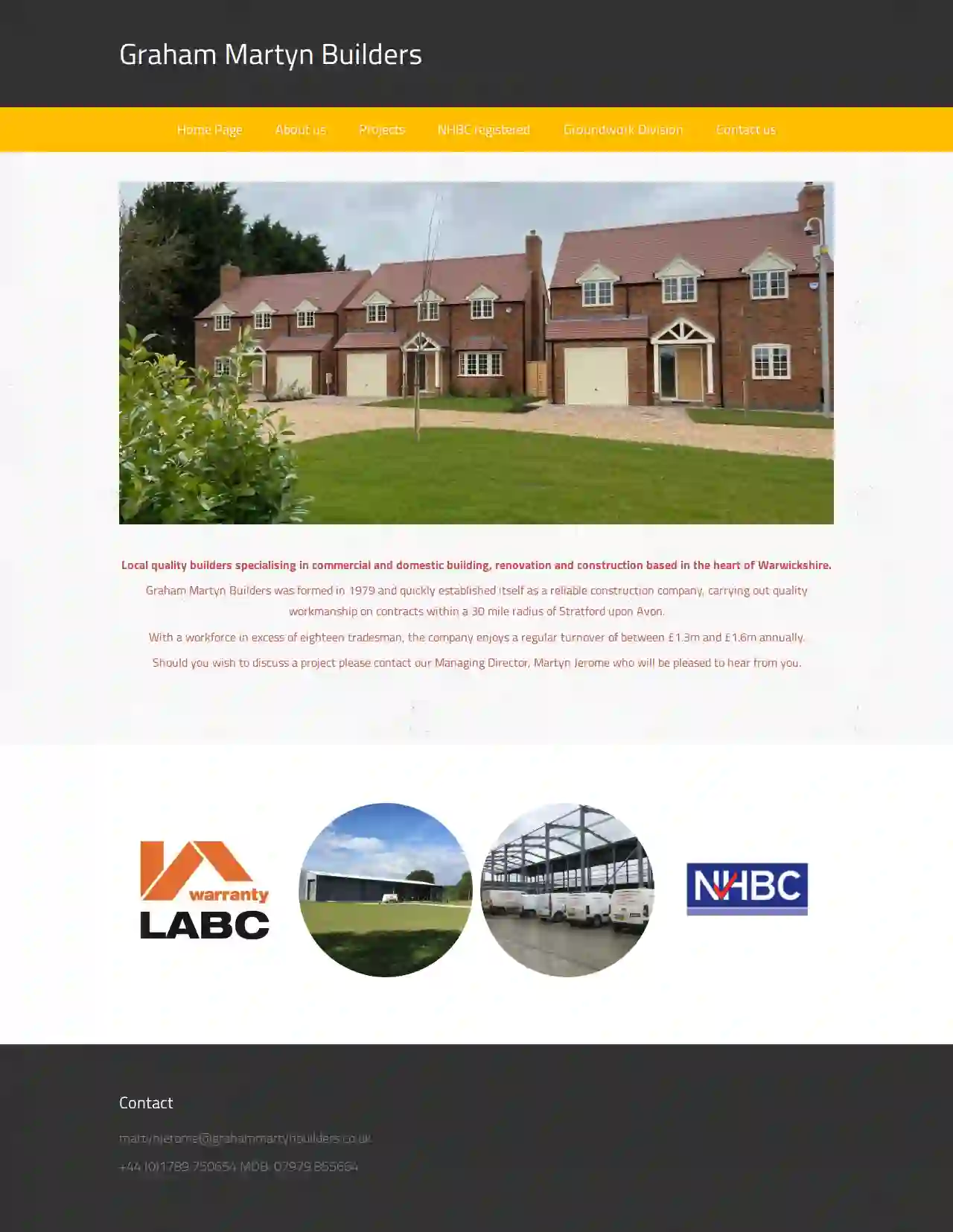
Graham Martyn Builders
The Oriel House, Church Lane, Welford on Avon, Stratford upon Avon, Warwickshire., CV37 8EL, GBAbout Graham Martyn Builders Graham Martyn Builders is a local, family-run business with a rich history spanning over 40 years. Established in 1979, we've built a solid reputation for delivering high-quality construction projects across Warwickshire and beyond. Our team of skilled tradespeople, boasting over 18 professionals, is dedicated to exceeding client expectations on every project. We specialize in both commercial and domestic building, renovation, and construction, handling projects of all sizes. From large-scale commercial developments to individual house builds, we've got the expertise and experience to bring your vision to life. Our commitment to quality is reflected in our consistent annual turnover of £1.3m to £1.6m, a testament to the trust and confidence our clients place in us. We're proud to be NHBC and LABC registered builders, offering 10-year warranties on all new homes, providing peace of mind for our clients. We understand that every project is unique, and we take the time to listen to your needs and goals. Our Managing Director, Martyn Jerome, is always happy to discuss your project in detail and provide expert advice.
- Services
- Why Us?
- Accreditations
- Our Team
- Gallery
Get Quote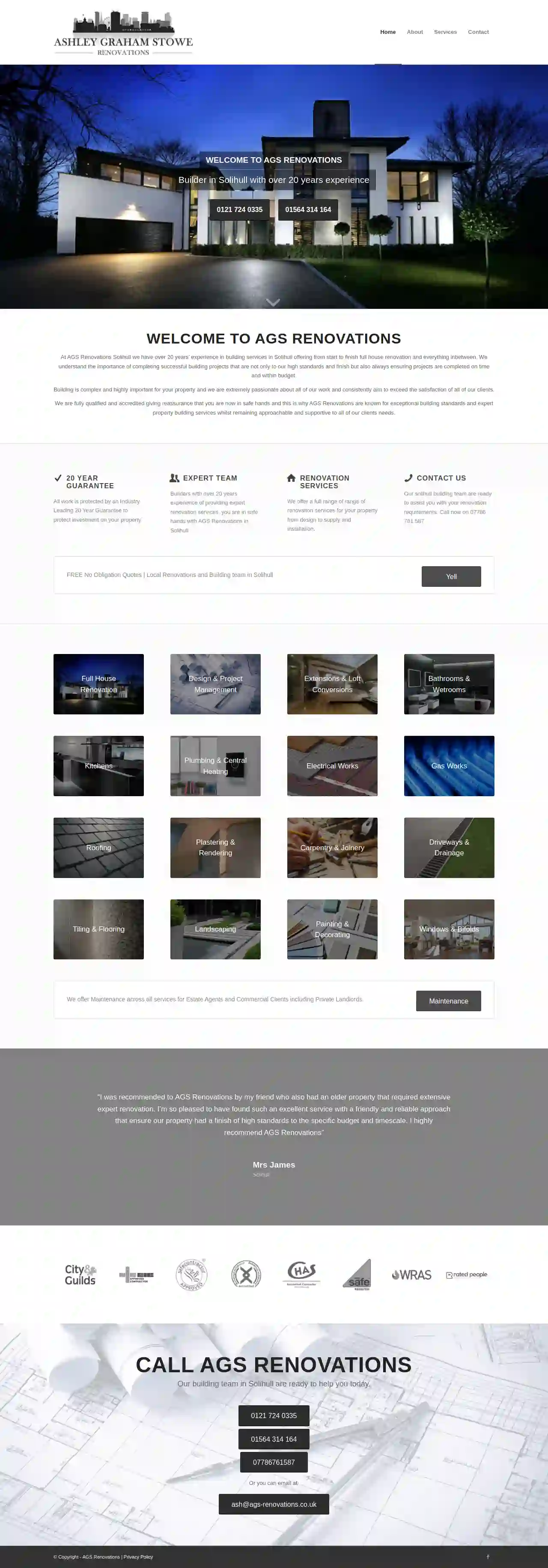
AGS Renovations
52 reviewsWarwick, GBWelcome to AGS Renovations At AGS Renovations Solihull we have over 20 years’ experience in building services in Solihull offering from start to finish full house renovation and everything inbetween. We understand the importance of completing successful building projects that are not only to our high standards and finish but also always ensuring projects are completed on time and within budget. Building is complex and highly important for your property and we are extremely passionate about all of our work and consistently aim to exceed the satisfaction of all of our clients. We are fully qualified and accredited giving reassurance that you are now in safe hands and this is why AGS Renovations are known for exceptional building standards and expert property building services whilst remaining approachable and supportive to all of our clients needs. 20 YEAR GUARANTEE All work is protected by an Industry Leading 20 Year Guarantee to protect investment on your property. EXPERT TEAM Builders with over 20 years experience of providing expert renovation services, you are in safe hands with AGS Renovations in Solihull RENOVATION SERVICES We offer a full range of range of renovation services for your property from design to supply and installation.
- Services
- Why Us?
- Testimonials
- Gallery
Get Quote
Over 13,059+ Excavation Companies in our network
Our excavation experts operate in Southam and surroundings!
ExcavationHQ has curated and vetted Top Excavation Contractors near Southam. Find a trustworthy contractor today.
Frequently Asked Questions About Demolition Contractors
- Enclosure: Sealing off the asbestos-containing material to prevent fiber release.
- Encapsulation: Coating the asbestos-containing material with a sealant to bind the fibers.
- Removal: Carefully removing the asbestos-containing material and disposing of it safely.
- Permits and Regulations: Obtain all necessary demolition permits and comply with local building codes and environmental regulations.
- Contracts: Have a clear and comprehensive contract with the demolition contractor outlining the scope of work, payment terms, and liabilities.
- Environmental Laws: Comply with environmental laws regarding hazardous material removal, waste disposal, and pollution control.
- Neighboring Property Rights: Respect neighboring property rights and take measures to prevent damage or disruption to adjacent properties.
- Worker Safety: Adhere to worker safety regulations and provide a safe working environment for demolition crews.
What are the different methods of asbestos abatement?
What is asbestos abatement?
Do I need a permit for demolition?
What are the legal considerations for demolition projects?
What are the different methods of asbestos abatement?
- Enclosure: Sealing off the asbestos-containing material to prevent fiber release.
- Encapsulation: Coating the asbestos-containing material with a sealant to bind the fibers.
- Removal: Carefully removing the asbestos-containing material and disposing of it safely.
What is asbestos abatement?
Do I need a permit for demolition?
What are the legal considerations for demolition projects?
- Permits and Regulations: Obtain all necessary demolition permits and comply with local building codes and environmental regulations.
- Contracts: Have a clear and comprehensive contract with the demolition contractor outlining the scope of work, payment terms, and liabilities.
- Environmental Laws: Comply with environmental laws regarding hazardous material removal, waste disposal, and pollution control.
- Neighboring Property Rights: Respect neighboring property rights and take measures to prevent damage or disruption to adjacent properties.
- Worker Safety: Adhere to worker safety regulations and provide a safe working environment for demolition crews.